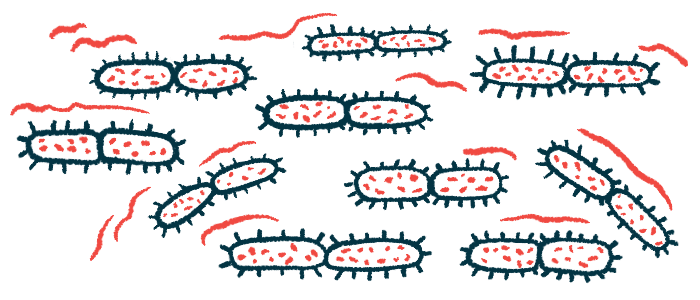Early MSSA Infection in CF Children Linked to Later Lung Decline: Study
Infection at an early age is associated with a 79% increased risk of lung exacerbations by age 8

In children with cystic fibrosis (CF), chronic lung infection with methicillin-susceptible Staphylococcus aureus (MSSA) before age 4 was associated with poor lung function by age 8, a small study concluded.
Early infection was also linked to an increased risk later of lung exacerbations, or a rapid worsening of symptoms.
The researchers noted that additional studies are needed to determine whether early chronic MSSA infection causes these later lung problems.
The study, “Association between early chronic methicillin-susceptible Staphylococcus aureus colonization and lung function in children with cystic fibrosis,” was published in Pediatric Pulmonology.
In CF, thick mucus accumulating in the lungs gives rise to cycles of infection and inflammation, which can lead to irreversible airway damage.
S. aureus is one of the earliest and most common disease-causing bacteria isolated from the airways of children with the disease. These bacteria are classified into two groups: those resistant to the antibiotic methicillin and those susceptible.
However, the impact of S. aureus in CF children is not as well defined as other bacteria commonly encountered in the disease, such as Pseudomonas aeruginosa.
This study aimed to determine whether early chronic infection with methicillin-susceptible S. aureus before age 4 was associated with worse lung function by age 8. The research team, at the Ihsan Dogramaci Children’s Hospital, Turkey, also investigated MSSA’s impact on nutritional status and exacerbation frequency.
Clinical data were extracted from the medical records of 26 children (61.5% female) with early chronic MSSA infection before turning 4, and 26 children (34.6% female) who had chronic infection between ages 4 and 6, defined as late-onset.
S. aureus infection at age 7–8 was seen in 87.5% of the early onset group and 91.3% of the late-onset group.
There were no other differences between the two groups regarding CF-related genetic defects and coexisting conditions, co-infection with other pathogens before 8, and P. aeruginosa infection between 7–8.
Data analysis revealed that, at 8, children with an early chronic MSSA infection had significantly worse lung function, based on spirometry tests, compared to the late-onset group.
Early onset was related to a significantly lower FEV1, the total amount of air exhaled in one second, and forced expiratory flow at 25%–75% of the vital capacity — the total amount of air exhaled after maximal inhalation. However, total forced vital capacity did not differ significantly between the two groups.
There were no differences between early- and late-onset chronic MSSA infection in nutritional status, as defined by body-mass-index (BMI), a measure of body fat.
Between 6 and 8, the median number of lung exacerbations was significantly higher in the early-onset chronic infection group (range 0–10) than in the late-onset group (0–4).
Lastly, early-onset chronic infection with MSSA was significantly associated with a 79% relative increased risk of lung exacerbations by age 8, according to a statistical analysis of the data.
“Our results showed that early chronic MSSA colonization was associated with poorer pulmonary functions in children with CF,” the researchers concluded. “Further studies are needed to reveal the cause-and-effect relationship between early chronic MSSA colonization and pulmonary outcome.”








